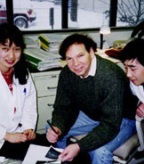 Associate Professor
Associate Professor
Department of Cell Biology
Education and Training
A.B., Columbia College
Ph.D., Albert Einstein College of Medicine
Contact
Phone: 860-679-2810
Email: epstein@uchc.edu
Fax: 860-679-3693
Office: E2038
UConn Health
263 Farmington Avenue
Farmington, CT 06030
Research Interests
Research in the Epstein laboratory centers on second messengers and signal transduction. Particular focus has been on cyclic nucleotide metabolism and protein phosphorylation, with emphasis on analysis of cyclic nucleotide phosphodiesterases (PDEs). It has become apparent, in recent years, that PDE is a superfamily of enzymes encoded by 21 different genes, grouped into 11 gene families, based on sequence similarity, mode of regulation and preference for cAMP or cGMP as substrate. With the existence of multiple transcription initiation sites, as well as alternatively spliced forms of many of these genes, more than 100 different forms of PDE have been identified and cloned to date, and many of these PDE forms are localized to different cells and different subcellular compartments as part of complexes or signalosomes composed of scaffolding proteins, cAMP effectors, and distinct PDEs, thus achieving targeted cAMP degradation and the creation of localized intracellular cAMP gradients and allowing the control of specific cellular functions by specific PDE isoforms during cellular signaling. Hence, by inhibiting or altering the expression of specific forms of PDE, cAMP levels in specific cell types can be altered, and fundamental physiological processes in one cell type can be changed, without affecting others. Thus, a main research goal in this laboratory is to examine the tissue distribution of different forms of PDE and regulation of their expression during development and in different pathophysiological states so that specific PDE isoforms can be targeted to treat a number of different diseases. The focus of our research has been to identify and inhibit specific PDE isoforms as novel treatment methods for leukemia, breast cancer and autoimmune and inflammatory illnesses.